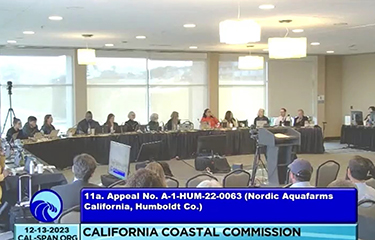The California Coastal Commission has denied five separate appeals challenging permits granting Nordic Aquafarms’ rights for its planned yellowtail recirculating aquaculture system (RAS) in Humboldt County, California, U.S.A.
The board heard appeals by 350 Humboldt, Redwood Region Audubon Society, Salmonid Restoration Federation, and residents Alison Willy and Scott Frazer on its decision to grant permits with conditions for Nordic Aquafarms California to demolish a former pulp mill near the town of Eureka, California, and establish an RAS facility. Originally planned as a salmon RAS, Nordic Aquafarms has since changed course and now plans to farm yellowtail.
The project has been approved for five new buildings totaling 700,000 square feet, production of 3,000 metric tons (MT) annually of head-on, gutted fish in phase one and up to 15,000 MT in a planned Phase 2, and the use of 300,000 gallons per day of freshwater for processing.
Appellants had multiple different complaints, including the climate impact of the project, its potential affects on marine resources from its intake and discharge pipes, the construction of a fire road in sensitive dune habitat, the impact on public access to the area, and a lack of an evacuation plan in case of tsunami.
The Salmonid Restoration Federation said in its appeal that the impact of extracting water from Humboldt Bay could adversely affect the conditions needed for juvenile salmonids.
“Water extraction from the fisheries nursery in Humboldt Bay may turn out to be a tragedy of the commons, where cumulative loss makes the resource unusable by all,” Salmonid Restoration Federation Executive Director Dana Stolzman said in a letter to the commission.
The appeal from 350 Humboldt asserted that calculations of the facility’s potential greenhouse gas emissions didn’t take into account for mismatches between Nordic’s renewable energy certificate and its power utilization, and that it didn’t correctly include the emissions caused by manufacturing fish feed for the facility.
Melissa Kraemer, the coastal program manager for the commission’s North Coast district, said that based on staff assessments, the concerns raised in the appeal aren’t enough to reject the permitting.
“While the approved development is a relatively large project, its footprint and scope are limited to brownfield lands and redevelopment of areas that historically were developed with industrial uses,” Kraemer said during the commission’s hearing. “Given the high degree of factual and legal support for the county’s decision, and its required conditions of approval, staff believes that the consideration of the five factors together support a conclusion that no substantial issue is raised.”
Ultimately, the California Coastal Commission voted unanimously to reject all five appeals.
Photo courtesy of the California Coastal Commission/Cal-Span







